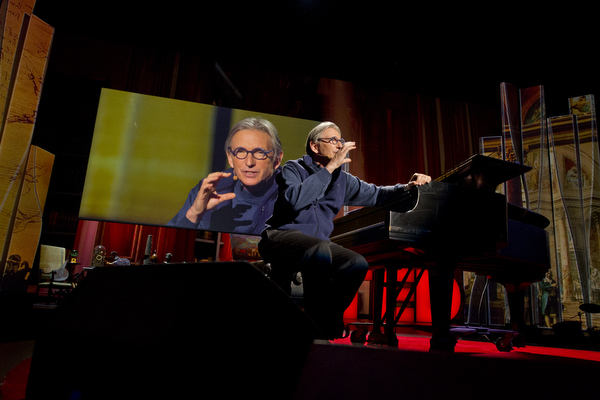Photo: James Duncan Davidson
Michael Tilson Thomas is the music director of the San Francisco Symphony, founder and artistic director of the New World Symphony and principal guest conductor of the London Symphony Orchestra. Now he’s up to round off this session in style, seated at a grand piano that’s been wheeled onto the stage just for his purposes.
He kicks off by telling the story of his father, Ted. He was, says Tilson Thomas, an illustrator and a musician “though he didn’t read a note.” He was also profoundly hearing-impaired — but nonetheless his son’s greatest teacher of the power of music. “My parents gave me the opportunity to discover together with them. I’m inspired by that memory and I’ve tried to bring that to as many people as I can,” he says. He also loves wondering how music enters into people’s lives in the first place, and recalls seeing a kid hit a home run while playing baseball on a New York street, and in triumph, trumpeting a Mozart medley. How did that happen?
Now Tilson Thomas dives into an admittedly daring task, explaining the history of music over the last 1000 years. Playing flourishes at the piano, he shares how people liked musical pieces to conclude in the 11th century, the 17th century, even today. There’s a reason we like to hear the notes we do today, he says. We’ve inherited “centuries worth of changes in musical theory, practice and fashion.” The secret weapon? Music’s silent partner: notation. “The impulse to notate, to code music, has been with us for a very long time.” So then he gives us a quick tour of various notation systems over the centuries, from a Greek gravestone inscribed with a eulogy for a dead wife from 200BC to a Christmas mass from the 10th century to the slightly more detailed scores in the 13th century, which started off the system we’re familiar with today.
Now, classical music is essentially a dialogue between the two powerful sides of our nature: instinct and intelligence, between improvisation and composition. While the improviser senses the next cool move, the composer considers all moves. And while many of the greats (Bach, Mozart) were a combination of the two, every musican strikes a different balance between faith and reason, between the “what” and the “how,” of which Tilson Thomas now takes us on a historical tour.
In the early days, music was written to mirror God’s mind as seen in the design of the night sky. The “how” in this era: polyphony, independently moving voices that suggest how the planets move. “Truly this was the music of the spheres.” Then, in 1600, came the birth of opera, a development whose “what” was not to mirror the mind of god but to follow the emotional turbulence of man. The how, now: to stack up chords of harmonies, with an incredible variety of emotions. Here, Tilson Thomas takes a moment to contemplate the difference between a major and a minor chord, the difference between happiness and sadness. “37 freaking vibrations,” he says drily, to applause.
Around 1880, music changed once again, as a new, miraculous way of passing things on meant that people could now hear music all the time, without needing to be able to play an instrument, read music, or even go to a concert. “Technology democratized music by making everything available; it spearheaded cultural revolution,” says Tilson Thomas. “Technology pushed composers to tremendous extremes; computers and synthesizers [prompted] intellectually impenetrable complexity.” And at the same time, technology pushed us to live in a culture of improvisation that is sliced, diced, distributed and sold. What is the long term effect of this? No one knows. But one real question remains: what happens when the music stops? What sticks?
To answer his own question, he tells the story of visiting a cousin in an old age home. He spied a shaky old man making his way across room to try and play something on the piano. Tilson Thomas thought he recognized the piece and played it and watched the man’s face light up. “Yes! I was a little boy! Isaac Stern! The Symphony! I heard it!” Humbled by how much music meant to this man, Tilson Thomas says this inspired him to continue with his work on symphonies, on the Internet and with everyone he can meet. “Sure, events attract a lot of attention. What really matters is what goes on every day,” he concludes. “All that “what” and “how” is out there waiting for you to discover its “why”. Dive in and pass it on.” Calm, understated and lovely.

Comments (8)
Pingback: TEDActive 2012: Billy Collins, Michael Tilson Thomas | Matt Wallaert
Pingback: Community of Revolutionaries « Tuxedo Revolt Blog
Pingback: The What, How and most importantly – Why of music « ListenToGoodMusic
Pingback: Music and emotion through time « Todd's Perspective
Pingback: Michael Tilson Thomas: A Brief History of Classical Music | American Orchestra Forum Michael Tilson Thomas: A Brief History of Classical Music | A conversation with America’s leading orchestras
Pingback: TED Blog | A brief history of classical music: Michael Tilson Thomas … | Jan Bergmans Weblog